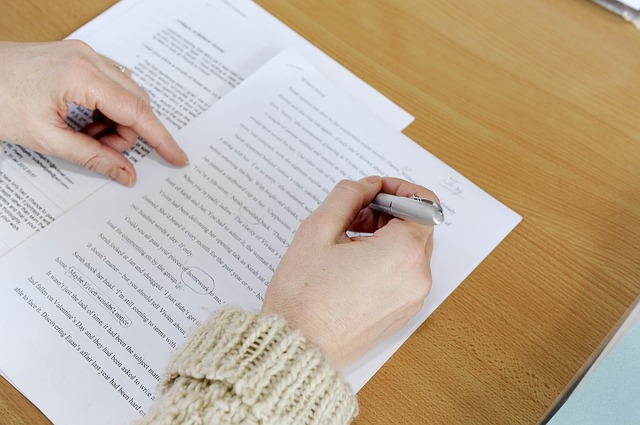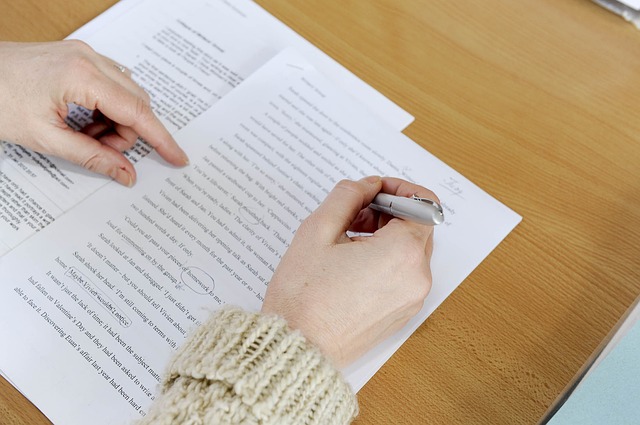There is always a misconception regarding academic editing and academic proofreading. Although they can be used interchangeably, editing and proofreading services are two different stages of the revision process. In this article, the concepts of proofreading and editing will be cleared accordingly, focusing on the basic differences as well as techniques to accomplish both tasks.

There has always been a misconception regarding academic editing and academic proofreading. In this article, the concepts of proofreading and editing will be cleared accordingly, focusing on the basic differences as well as techniques to accomplish both tasks.
Proofreading and editing are two major aspects that are to be focused on in order to successfully complete an academic content file. Although editing and proofreading are two different services, requiring different sets of skills, it can be said that the quality of the final article depends upon both proofreading and editing equally. Both of these two aspects of academic content writing are immensely important to be carried out in order to put up high-quality academic content with zero error and great readability or flow. If you are looking forward to knowing more about how academic proofreading is different from academic editing, then let us tell you that you've come to the right place. This article will help you to understand the basic differences between academic editing and academic proofreading.
Proofreading is generally considered the final scrutinization process. All academic files, before getting published, go through a process of proofreading. Thus, proofreading is always conducted on the final draft of the manuscript. Proofreading is carried out only to address minor issues of surface level. Majorly it can be said that the general purpose of proofreading is to eliminate grammatical mistakes in a manuscript.
However, proofreading does not aim to the word count reduction of the text. Errors regarding formatting and inconsistency in the academic article are majorly addressed through the proofreading procedure. Proofreading also doesn't require much help from the author as it doesn't make changes in the content of the academic paper.

The proofreading procedure is mostly used to enhance the quality of the academic content by mitigating essential errors in grammar, punctuation, syntax, and spelling. Thus, it can be concluded that the final edited file is sent for proofreading and the grammar and spelling mistakes, enhancing the overall quality of the academic content. Proofreading is conducted prior to the final publishing of the paper to resolve all existing issues and create high-quality academic content.
The main purpose of proofreading is to correct all errors in grammar, punctuation, syntax, and spelling in a manuscript. If you wish to see whether the final version of your document contains any minor errors, then you need proofreading services instead of editing services.
Editing academic content is a totally different concept compared to proofreading. Editing necessitates more of an extra effort from an editor than does proofreading. Academic editing aims to improve the academic quality of your manuscript, hence the content, overall structure, quality of findings and analysis, simplicity, and referencing. Editing is always conducted on the very first draft of the content and is kept under the process of editing until the final draft is made. In the process of academic editing, the content goes under subsequent changes throughout in order to enhance the readability and clarity of the academic content. Further, in editing, the major aspect which is focused on is the smooth narration of the content.
The editing process continues to proceed accordingly with the gradual compilation of the content. Editing can bring about changes in the content in order to enhance the clarity of the applied concepts or increase the readability. Thus, it can be inferred that editing allows a decrement or increment in the overall word count of the manuscript. Furthermore, the editing process, unlike proofreading, increases the overall academic quality of the content.
Editing will mostly make some fundamental changes to improve the standard of the academic writing of the manuscript. Accordingly, editors sometimes re-write some parts of the document. This is especially important because an editing service aims to guarantee that the purposes of the document are met.
Also, the editor is always required to stay in touch with the authors of the paper as editing requires chance in the consent or the concepts of the content in order to make the content easy to assess. The clarity in concepts is the main aspect, which is focused on academic editing. Academic editing also includes editing and formatting of the references or the bibliography section. The reference requirement of the file is further scrutinized during editing and is checked according to the status of the file.

An editing service ensures that a paper is error-free. Thus, an editor will correct all errors in grammar, typography, punctuation, syntax, and spelling in a manuscript. In this sense, the editing service includes proofreading service as well. However, strictly speaking, proofreading a manuscript is the last stage before it is delivered to the client. Therefore, even if an editor has corrected many of the errors that a proofreader would correct, the document must still pass through this last stage—proofreading.
|
Academic editing |
Academic proofreading |
|
Enhances the use of language and vocabulary. |
Focuses on only grammatical errors made by the author. |
|
Mitigates all kinds of clarity and readability issues. |
Mostly mitigates surface issues such as grammatical errors, spelling errors, and inconsistency. |
|
Performed on the very first draft of the academic content. |
Performed on the final draft of the academic content. |
|
Allows decrement or increment of overall word count. |
Does not allow any decrease or increase in the word count. |
|
Requires interference of the main author(s). |
Does not require the interference of the main author(s). |
|
Addresses the issues related to the clarity and readability of the content. |
Addresses the issues related to grammatical errors, spelling mistakes, or punctuation errors in the file. |
|
Helps in improving the academic approach of the content. |
Does not majorly aim to improve the academic content. |
|
Knowledge of the subject matter of the content is required. |
Knowledge of the language, including grammar and spelling, is required. |
|
Takes a long period of time and continues unless the file is totally completed. |
Takes a relatively shorter period of time. |
From the above-mentioned differences, it can be inferred that the success of the academic content file depends majorly upon but the aspects, academic editing as well as academic proofreading. Both of these aspects are equally responsible for making academic content readable and understandable. Academic editing and academic proofreading defer in almost all aspects as editing focuses on the overall correctness of the file in terms of concepts, readability, etc., whereas the proofreading process only focuses on the manual errors left behind by the authors in the file, such as grammatical errors, spelling errors, and punctuation errors.
Furthermore, the editing process is not only used to enhance the quality of the content but also the bibliographic section is edited in this process.
Overall, file formatting is conducted through the process of proofreading. The file goes through the steps of editing and finally comes to the step of proofreading; the mistakes to be mitigated are identified by means of proofreading and are corrected accordingly. After going through all the steps, the final content holds certain quality and is particularly error-free. The file is now eligible for final publishing.
Editing services will format your documents for journal submission. Where the manuscript is one intended for publication in a journal, the main purpose of formatting is to ensure that your manuscript text is consistent with your target-journal guidelines. This includes layout, font selection, spacing, formatting of headings, in-text citations and references, title page check, a check to ensure the appropriate placement of tables and figures as well as the inclusion of all required sections.
However, editing services do not cover academic writing or extensive formatting services. If the manuscript requires extensive journal-specific formatting (e.g., creating a reference list, adding missing citations), the assigned editor will include a detailed note about how the text did not meet the formatting requirements. Thus, the creation of a reference list with a full reference to every citation in the text and every work cited in the notes, placing the reference at the appropriate point in the text, or adding citations to narrative parts of the manuscript, etc., is beyond the basic editing service and requires extensive formatting service. That means the assigned editor will check the existing formatting and fix the detected issues but will not create a new reference list or add missing citations, endnotes, or footnotes as these corrective measures fall outside of the responsibility of the editor.
Whether your document is a dissertation, a master’s thesis, a term paper, or a business document, to make it shine, we mostly advise our clients to opt for editing services instead of proofreading services.
Best Edit & Proof expert editors aim to provide your manuscripts with proper scholarly and academic tone and style. They will significantly improve the chances of having your research manuscript accepted for publishing. They provide subject-area proofreading and editing services in several fields categorized under various disciplines. With our extensive knowledge and expertise, we will help you find the right tone and style for your manuscript.
If you need our subject-area editors to format your manuscripts, giving you the fundamental rules for formatting your manuscripts as described in your guidelines, such as APA, MLA, or Chicago/Turabian styles, then contact us. At Best Edit & Proof, our proofreaders and editors edit every type of academic paper. We have a user-friendly website and a simplified ordering process.
If you would like our subject-area editors and language experts to work on your project for the improvement of its academic tone and style, then please visit the order page. It is easy! It takes only a few minutes to submit your paper and complete the process. Click here to see how it works.
We have flat-rate pricing based on our type of service (editing or proofreading), word count, and turnaround time. Enter your word count or copy and paste your document into our pricing calculator to get an instant quote.
If you need support for editing and proofreading services, contact us. You can also e-mail us or use the 24/7 live chat module to get direct support. We have a 24/7 active live chat mode to offer you direct support along with qualified editors to refine and furbish your manuscript. Alternatively, you can text us through our WhatsApp business line.
Follow us on Twitter, LinkedIn, Facebook, Instagram, and Medium.
For more posts, click here.
This article discusses the difference between academic editing and proofreading services. To give you an opportunity to practice your proofreading, we have left a few spelling, punctuation, or grammatical errors in the text. See if you can spot them! If you spot the errors correctly, you will be entitled to a 10% discount.

Every book that you read, every newspaper and magazine you subscribed to, every blog that you have come across — all went through the radar of editing and proofreading before coming to you. So, if you are thinking about whether you can make a career in the field of editing and proofreading or not, the answer is yes. The only thing is, you need to have the talents and the qualifications, all of which we will discuss in this article. Therefore, if you are ready, let us look at all the things you need to know to become a proficient editor or proofreader.
Continue Reading
Editing and proofreading your manuscript is an important step before submitting it to peer-review journals. In this guide, we will go through the step-by-step process of editing and proofreading before your manuscript gets submission-ready.
Continue Reading
Proofreading is one of the basic procedures carried out on a text to render it flawless. This procedure requires extensive knowledge and comprehension to correct a manuscript excellently. Proofreading is of importance when you need your document to be checked for errors in grammar, punctuation, syntax, spelling, and formatting.
Continue Reading